

Internet Archive: Digital Library of Free Books, Movies, Music & Wayback Machine. Just Facts. Tonewords.pdf. A Skeptic's Guide to Health News and Diet Fads. Critical Media Literacy: TV Programs. ReadWriteThink couldn't publish all of this great content without literacy experts to write and review for us.
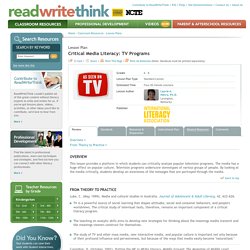
If you've got lessons plans, videos, activities, or other ideas you'd like to contribute, we'd love to hear from you. More Find the latest in professional publications, learn new techniques and strategies, and find out how you can connect with other literacy professionals. More Teacher Resources by Grade Your students can save their work with Student Interactives.
More Home › Classroom Resources › Lesson Plans Lesson Plan Overview From Theory to Practice This lesson provides a platform in which students can critically analyze popular television programs. LISTEN /This American Life Podcast. LISTEN / Radiolab. LISTEN / Library of Congress. LISTEN / TED Radio Hour. Snopes NY Times. INFORMED CITIZEN. Reading Strategies. Teaching During Reading Self-Questioning Strategies What are Self-Questioning Strategies?
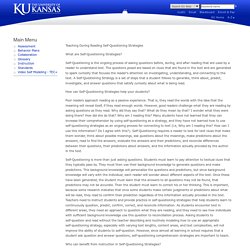
Self-Questioning is the ongoing process of asking questions before, during, and after reading that are used by a reader to understand text. The questions posed are based on clues that are found in the text and are generated to spark curiosity that focuses the reader's attention on investigating, understanding, and connecting to the text. A Self-Questioning Strategy is a set of steps that a student follows to generate, think about, predict, investigate, and answer questions that satisfy curiosity about what is being read. How can Self-Questioning Strategies help your students? Poor readers approach reading as a passive experience. Self-Questioning is more than just asking questions. Who can benefit from instruction in Self-Questioning Strategies? Useful Web Sites. 147-tiemensma-en.pdf. Compare-Contrast, Cause-Effect, Problem-Solution: Common 'Text Types' in The Times. Monica Almeida/The New York TimesHow does a bad economy affect businesses like Phoenix Decorating in Pasadena?
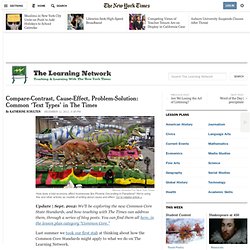
We’re using this and other articles as models of writing about cause and effect. Go to related article » Update | Sept. 2012: We’ll be exploring the new Common Core State Standards, and how teaching with The Times can address them, through a series of blog posts. You can find them all here, in the lesson plan category “Common Core.” Podcasts and Downloads - Jeremy Vine’s Being Human. This Am. Life FREE. What is a Podcast? via NYT / iTunes. Disinformation. Most of us lie and get lied to every single day.
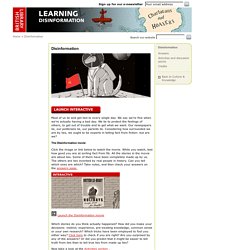
We say we're fine when we're actually having a bad day. Harvard Close Reading. National Debt – Just Facts. * The U.S.

Constitution vests Congress with the powers to tax, spend, and pay the debts of the federal government. Legislation to carry out these functions must either be: passed by majorities in both houses of Congress and approved by the President; or passed by majorities in both houses of Congress, vetoed by the President, and then passed by two-thirds of both houses of Congress; or passed by majorities in both houses of Congress and left unaddressed by the President for ten days. * Other factors impacting the national debt include but are not limited to legislation passed by previous congresses and presidents, economic cycles, terrorist attacks, natural disasters, demographics, and the actions of U.S. citizens and foreign governments. * In 2014, the Congressional Budget Office (CBO) projected the debt that the U.S. government would accumulate under current federal policies.
Speech Analysis: How to Critique a Speech. Published: Jan 18th, 2008 Studying other speakers is a critical skill, one of the 25 essential skills for a public speaker.
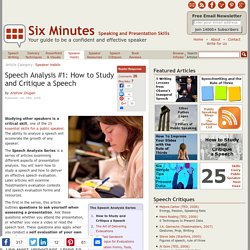
The ability to analyze a speech will accelerate the growth of any speaker. The Speech Analysis Series is a series of articles examining different aspects of presentation analysis. You will learn how to study a speech and how to deliver an effective speech evaluation. Later articles will examine Toastmasters evaluation contests and speech evaluation forms and resources. The Speech Analysis Series The first in the series, this article outlines questions to ask yourself when assessing a presentation. Ethos, Pathos, Logos. Classical Rhetoric: The Three Means of Persuasion. Welcome back to our ongoing series on classical rhetoric.
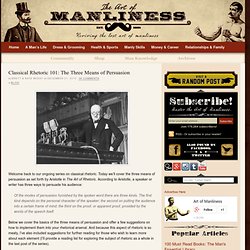
Today we’ll cover the three means of persuasion as set forth by Aristotle in The Art of Rhetoric. According to Aristotle, a speaker or writer has three ways to persuade his audience: Of the modes of persuasion furnished by the spoken word there are three kinds. The first kind depends on the personal character of the speaker; the second on putting the audience into a certain frame of mind; the third on the proof, or apparent proof, provided by the words of the speech itself. Developing critical thinking. It means not taking what you hear or read at face value, but using your critical faculties to weigh up the evidence, and considering the implications and conclusions of what the writer is saying.
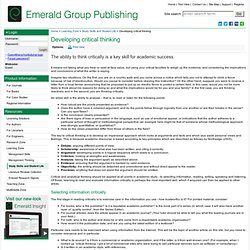
Imagine two situations. On the first, you are on a country walk and you come across a notice which tells you not to attempt to climb a fence because of risk of electrocution. Rate Study Habits. Depts.gpc.edu/~dunowl/handouts/authors-tone.pdf. Www.irsc.edu/uploadedFiles/Students/AcademicSupportCenter/WritingLab/Tone-and-Purpose.pdf. How to study - Dartmouth. Sorting out the truth in politics.